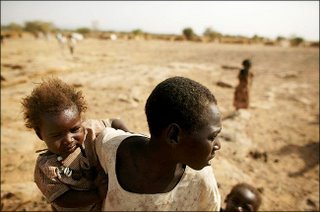
Reports, communiques and eye witness testimonies of civilian atrocities are one among several options in the humanitarian tool box. Sudanese government forces and their proxy militias have resumed their campaign against civilians across Darfur, and the heightened levels of violence make access and mobility difficult for aid agencies. The government claims it has returned to its rightful mission of clearing the state of insurgents. Witnesses say the attacks are indiscriminate and intended to decimate and terrorize specific civilian groups, whether they are armed or not.
An exerpt from a recent interview with operations directors of Doctors Without Borders captures the difficulties of responding effectively in Darfur, where twelve aid workers have been killed since June 2006 alone. "We are currently reaching the limits of our assistance. We do not have access to people who are directly affected by the conflict. [...] Today, the survival of populations in pockets where humanitarian assistance was still possible is jeopardized. Because of the lack of security, some of our operations in the field has been temporarily suspended, or continue with a smaller number of aid workers. Another consequence is that all our mobile medical activities, which target especially nomadic populations, had to stop."

Despite these difficulties, many agencies continue to document and report on ongoing atrocities, particularly against women. Rape of Darfuri women and girls is regular practice for government militias aiming to terrorize the population, break up families and destroy individual lives.
Documentation and public condemnation of the practice by aid agencies and human rights groups has been strident since war broke out in 2003. Government spokesmen dismiss the reports as 'Western propoganda', but will arrest aid workers involved in treating and documenting rape to dissuade them. So goes the debacle.
A UN communique today denounced the practice: "The rising rate of violence against women and children is increased by the participation of many different groups in these crimes. Warring parties seeking retribution against their opponents by inflicting humiliating punishment on civilians are flagrantly disregarding their obligations under international law. Moreover, there is scant evidence that culprits are being actively sought, let alone punished, for their crimes." [read the UN communique]
The Office for the High Commission of Human Rights, known as OHCHR, just published a detailed collection of testimonies documenting recent events in which "300 to 1000 armed militia from the Habbania Arab tribe carried out a series of attacks on some 45 villages in the Buram locality of South Darfur in late August. The attacks were reportedly marked by widespread targeting of civilians from tribes of “African” origin, wholesale burning of villages, looting and forced displacement. The population of the villages attacked is estimated to be about 10,000 people, mainly of the Zaghawa, Massalit and Misserya Jebel tribes.The attacks appear to have been conducted with the knowledge and material support of Government authorities, and the death toll is estimated to be as many as several hundred civilians."
There is one sign of hope in all this tragic reporting: at least there are people on the ground to document and bear witness to the seemingly relentless violence committed by government forces, and Darfuri rebel groups as well, against civilians.

No comments:
Post a Comment